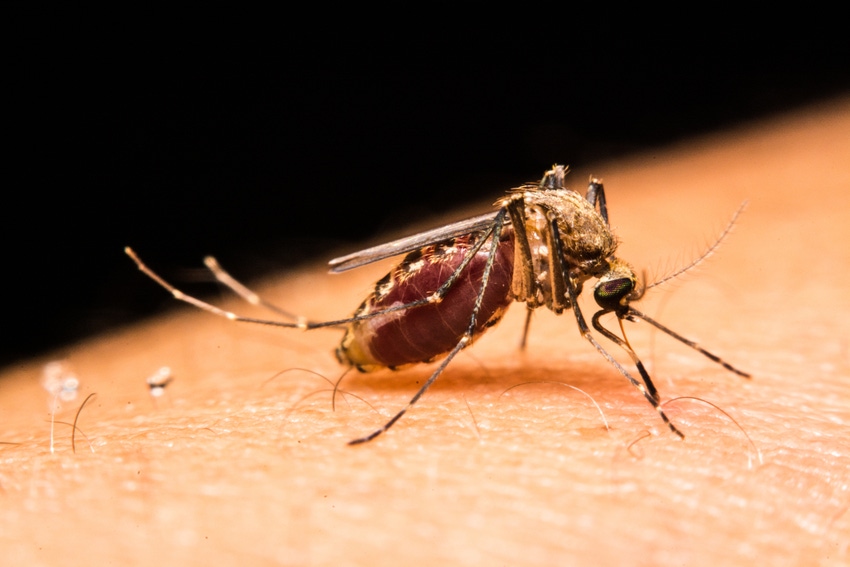
With nearly 2,000 human cases of Zika virus reported in 48 states as of August 10, and with a jump in the number of West Nile Virus (WNV) cases nationwide as well, health officials are warning residents to take an active role in minimizing risks associated with mosquitoes by helping to eliminate breeding grounds around their homes, businesses and neighborhoods, and by taking precautions when spending time outdoors.
Such concerns, usually limited to high density population areas, are now spreading into rural America, including growing risks to farm and ranch workers and the potential danger to livestock.
A check with the Centers for Disease Control in Atlanta indicates that while West Nile Virus is a known threat to livestock, especially equine, it is the more deadly West Nile encephalitis (WNE), or neuroinvasive West Nile virus (WNV), that is of greatest concern.
CDC officials say little is known about the threat of Zika virus in animals, largely because the Asian Tiger mosquito and the Yellow Fever mosquito, carriers of the virus, appear to favor feeding on humans over animals. But researchers warn that so far little is known about the risks and threat of Zika virus in birds and mammals and more research in that area is needed.
Nueces County officials—in the Texas Coastal Bend—are not waiting to get the word out about what some are calling a potential risk after trapped mosquitoes tested positive for WNV over the last two weeks, and following the latest human death in the U.S. from Zika virus in Houston earlier this month.
As part of a regular monitoring program to assess the threat of mosquito-borne diseases, health officials in the Coastal Bend have been conducting tests all summer and report a sharp rise in the number of mosquitoes confirmed to carry WNV in recent weeks. Those areas include neighborhoods in the City of Corpus Christi, prompting work crews to begin spraying those areas. At the same time, health officials are warning residents to be aware of the dangers by launching a media campaign in hopes of enlisting public assistance to minimize the threat.
For the latest on southwest agriculture, please check out Southwest Farm Press Daily and receive the latest news right to your inbox.
Officials are asking the public to inspect property and help reduce mosquito breeding grounds. They are also warning that while Aedes aegypti, the mosquito most likely to carry West Nile Virus, generally is more active shortly after dawn, early morning and again just before dark, the Asian Tiger mosquito and the Yellow Fever mosquito, carriers of Zika virus, remain active throughout the day.
ANIMAL CONCERNS
WNV is spread to humans by the bite of an infected mosquito and is not transmitted directly to people from animals or other people. However, people who directly handle sick or dead animals should take precautions, such as wearing gloves to avoid possible contact.
Zika virus has no known connection with animals; so far the transmission routes appear to be exclusively human-to-human with the necessary help from the right mosquito species. Yet, its association with birth defects brings to mind some viruses that can affect livestock, like Cache Valley Virus that hit sheep producers hard a few years back when new born lambs were being born with birth defects. Bovine Viral Diarrhea Virus is another example of a virus that causes birth-in animals.
The CDC remains neutral regarding the threat to livestock and other mammals from Zika virus until more research can be done about the emerging threat. But because of the potential for contact with disease-carrying mosquitoes on the farm and ranch, workers and rural residents are being advised to take precautions concerning contact with mosquitoes.
The nation’s meat inspectors who conduct regulatory verification activities outdoors were advised last week to protect themselves from mosquito-borne diseases. USDA’s Food Safety and Inspection Service (FSIS) personnel received written instructions on how to deal with the risks.
REPELLANTS RECOMMENDED
According to those instructions, FSIS meat and poultry inspectors involved in outdoor activities are being told to use insect repellents registered with the U.S. Environmental Protection Agency and which contain specific ingredients such as DEET or Oil of Lemon Eucalyptus. EPA-registered insect repellents are safe and effective, even for women who are pregnant or breastfeeding, according to the notice posted last week.
If mosquitoes do bite, officials say to watch for the following identifying symptoms:
ZIKA VIRUS – Most people do not usually develop symptoms when infected with the Zika virus. But when they do, fever, rash, joint pain, red eye, muscle pain and headaches are among the symptoms most often reported.
WEST NILE VIRUS – Head and body aches, joint pains, vomiting and rash are among the symptoms of West Nile Virus. However, the U.S. Centers for Disease Control and Prevention reports 70 percent to 80 percent of those infected won’t experience symptoms.
SAINT LOUIS ENCEPHALITIS VIRUS – Less than one percent of those infected show any signs. Symptoms are fever, headache, dizziness, nausea and malaise.
About the Author(s)
You May Also Like




